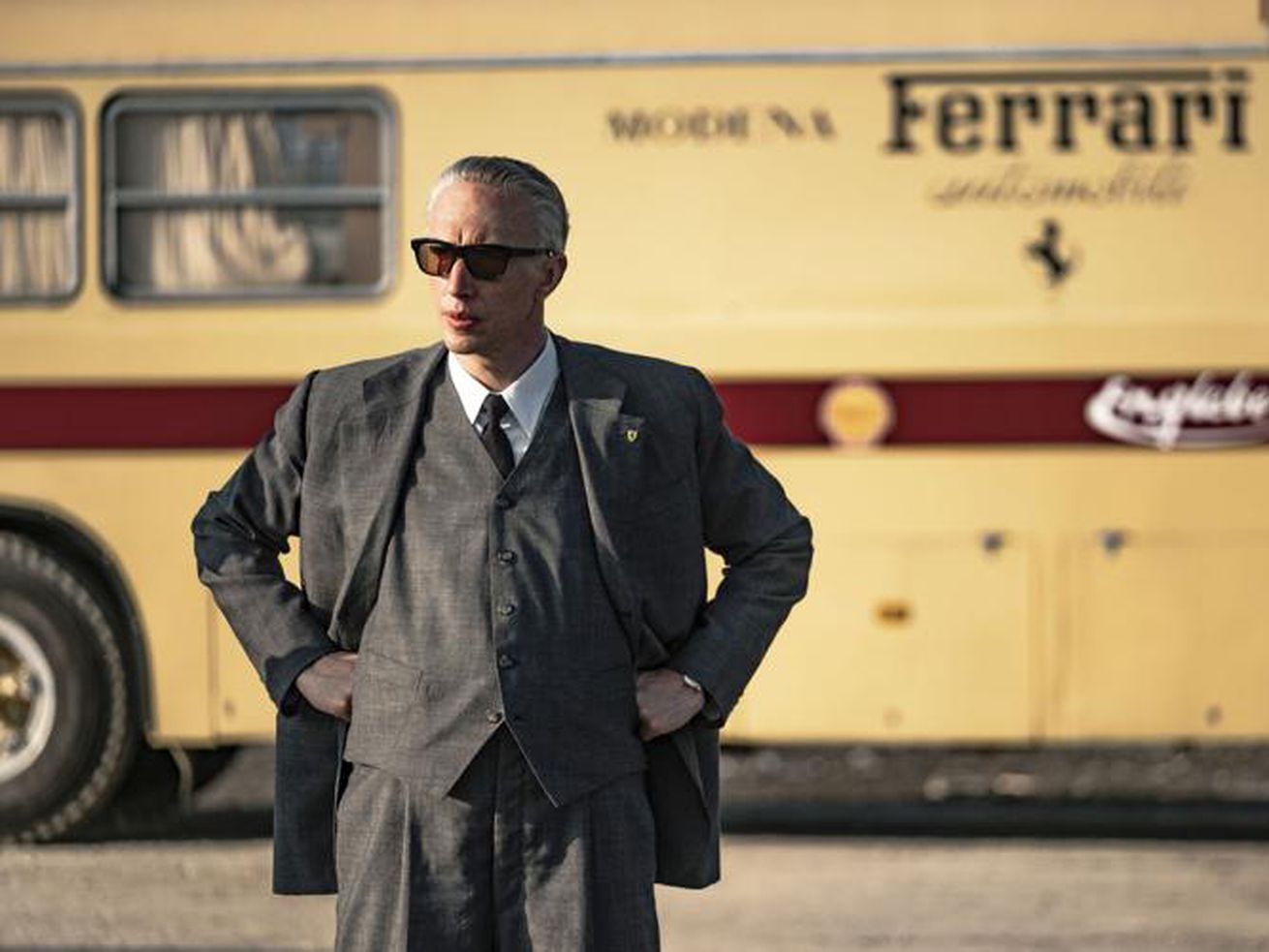
Enzo Ferrari (Adam Driver) has a lot on his mind in Michael Mann’s Ferrari. | Lorenzo Sisti
Director Michael Mann loves fast cars, experts at work, and authentic filmmaking, and it shows.
Christmas Day marks the release of the 12th movie from 80-year-old director Michael Mann, Ferrari. Focused on a tumultuous period in the life of Enzo Ferrari (Adam Driver) in the late 1950s, the film follows the founder as he juggles two families and his failing business. The fate of his namesake company comes down to his team’s performance in the Mille Miglia, a 1,000-mile race across Italy.
Ferrari might seem like a stock prestige biopic with Academy Award aspirations; it’s a period piece that shows us an Important Person at a crossroads, split between their personal and professional lives. Driver brings back his Italian accent from The House of Gucci; Penélope Cruz chews the scenery as Ferrari’s wife and business partner Laura, estranged after the death of their son, Dino; Shailene Woodley plays his girlfriend Lina, with whom he has a son outside his marriage, a potential heir to the Ferrari throne.
This film is a true passion project for Mann, however, who has been trying to make a Ferrari movie since the 1990s, his love affair with the cars dating back to the late ’60s. The director used his first big Hollywood paycheck on a Ferrari. Mann wasn’t able to get financing until 2022, and he proudly touts its independent production outside of the studio system and its distribution by Neon, the hip company responsible for bringing us films like Parasite, Triangle of Sadness, and Anatomy of a Fall.
If you don’t know enough about the source material to be hyped for a movie about Enzo Ferrari, Mann in the director’s chair might well be enough of a reason to see Ferrari. There’s a dedicated sect of film nerds who have season tickets for anything Mann directs, from TV’s Miami Vice and Thief in the 1980s through the big screen Miami Vice in 2006 and his “Can you believe Thor is a hacker!?” 2015 thriller Blackhat.
One of the hallmarks of Michael Mann’s films is that he likes stories about characters who are very good at their jobs. Thief features James Caan painstakingly cracking safes with drills and blowtorches. In Heat, we see Robert De Niro’s Neil McCauley studying books about metals to inform the planning for his elaborate heists. Almost every Michael Mann film features some sort of genius in their field, from FBI profilers (Manhunter) to dogged journalists (The Insider) to hackers (Blackhat).
Ferrari is no different, with Enzo Ferrari involved in every aspect of the effort to get his cars in racing shape. Mann takes care to show Ferrari drawing blueprints of faster engines and alternately berating and inspiring his team of drivers. In Mann films, it’s rarely in doubt whether or not these experts have the skills to get the job done — it’s whether or not they can overcome their circumstances to do so, whether they’ve been dragged back to their trade for one last job or are working up the courage to make a stand against long odds.
It’s easy to be cynical about Mann’s reputation for depicting stylish, hypermasculine protagonists with emotional baggage. Enzo Ferrari more than fits the bill, looking the part in sunglasses and tailored suits while he bounces around between the two women in his life and his business is on the verge of bankruptcy. Ferrari’s drivers are all impeccably handsome and also fearless, because racing is a dangerous sport.
Because of that danger, it’s a big deal when an actor gets behind the wheel of a race car. The allure of racing fast cars has been an obsession for Hollywood actors for decades, from Steve McQueen to Paul Newman to Rowan Atkinson to reigning Sexiest Man Alive Patrick Dempsey, who is in Ferrari playing Italian driver Piero Taruffi (with a shock of un-McDreamy-like near-white hair). Thankfully, the racing scenes in Ferrari work, partially because Dempsey does his own stunt driving, actually going really, really fast.
Mann has a slavish devotion to accuracy; in interviews, he proudly touts the elements of his films that are ripped from real life. For Thief, he hired real safecrackers as consultants, telling the Ringer, “We didn’t have a props department because all we did was use all of [jewel thief] John Santucci’s work tools and his attitude.” The real-life techniques Mann portrays in Blackhat helped establish its reputation as one of the only films that gets hacking right. For Heat, Mann had the cast undergo real combat training, leading to a famous story about footage of Val Kilmer reloading his rifle being used to train real Special Forces cadets at Fort Bragg.
In interviews for Ferrari, Mann often eagerly discusses the real-life details he brought to the film. In a featurette, Mann recounts the process of recreating the period-specific Ferraris by developing 3D scans of the original vehicles and rebuilding them with modern technology. Speaking to the Guardian, he touts the faithful sound effects included in the film, gleefully adding, “Ferraris make a sound like no other cars. It’s music.”
The races in Ferrari feel real because, to a certain extent, they are. In an era where CGI is used for everything from backgrounds to faces to superhero punch-fests, the directors who can show us something legitimate are fewer and farther between. There’s a big difference between Le Mans and The Fast and the Furious, and Ferrari is buoyed by Mann’s dedication to authenticity, by the impression that there was a camera strapped to Dempsey’s car.
In modern Hollywood, the power to call your shot — figuratively and literally — is vanishing. When a director signs on to do a big-budget Marvel movie, the film comes prepackaged with a small army of CGI artists ready to paint in all the special effects. Ferrari was independently produced, but it wasn’t cheap. Instead, Mann designed it with care, with shots of the Italian countryside feeling as thoughtfully composed as the ones where we follow a driver moving a hundred miles per hour.
The expert Mann might be most interested in is himself, as Ferrari doubles as a film about directing a film. In scenes where Enzo Ferrari is trying to inspire his drivers or demanding meticulous precision from his crew, it’s difficult not to think Mann’s speaking to his own experiences with actors and his below-the-line staff. It’s a hard job, being in charge, and Mann seems fascinated with Ferrari because, paraphrasing the film, he doesn’t race cars to run an automotive business — he runs a business so he can race. Mann’s films are often commercial, but Ferrari reminds us he makes them for the love of the art form, not just to rack up big box office numbers.
The strongest parts of Ferrari are imbued with Mann’s dedication to proper filmmaking. It would certainly be easier to cheat and use CGI to make it seem like Enzo Ferrari’s cars are going fast. Having the skill and the wherewithal to show us the real thing is something only a director like Michael Mann is equipped to do.
——————————————-
By: Renan Borelli
Title: Ferrari is an ode to dudes who love cars, from one of their own
Sourced From: www.vox.com/culture/24011454/ferrari-michael-mann-adam-driver-enzo
Published Date: Sun, 24 Dec 2023 13:00:00 +0000
Read More
Did you miss our previous article…
https://politicscope.com/national-politics/the-best-ways-to-help-homeless-people/
I'm a writer for lifestyle publications, and when I'm not crafting stories, you'll find me cherishing moments with my family, including my lovely daughter. My heart also belongs to my pets—Sushi, Snowy, Belle, and Pepper. Besides writing, I enjoy watching movies and exploring new places through travel.

